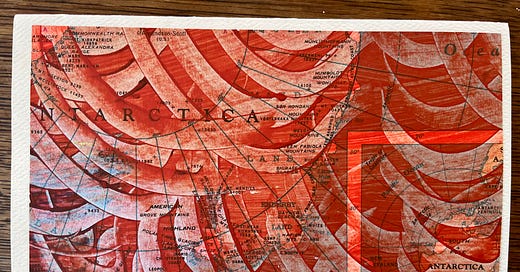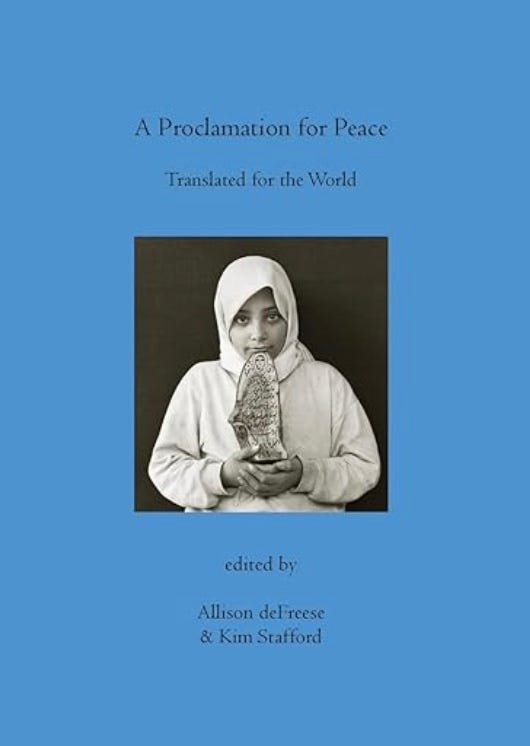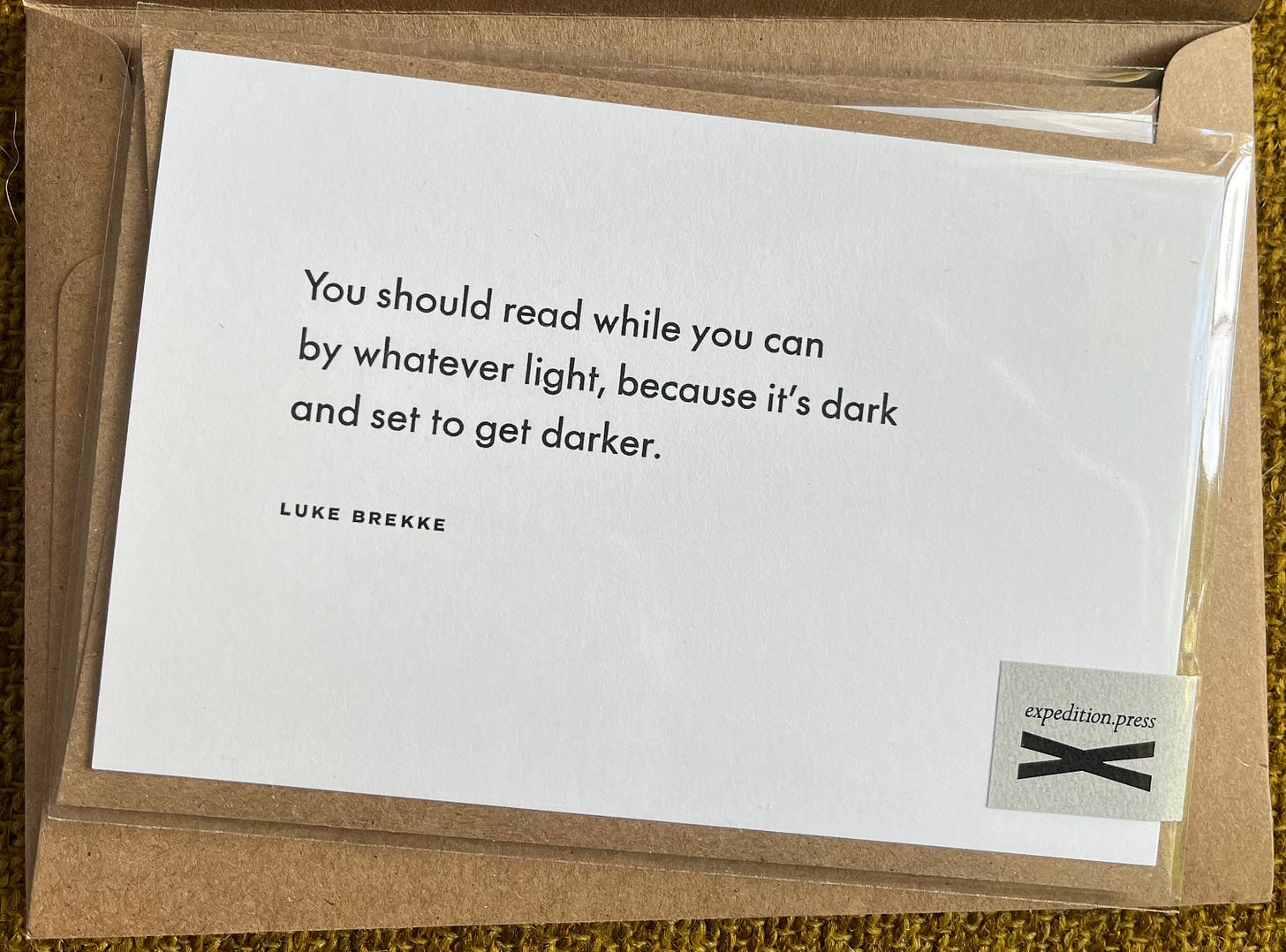Whereas the World is a House on Fire
A Proclamation for Peace by Kim Stafford, and how to find refuge in words

You should read while you can by whatever light, because it's dark and set to get darker —Luke BrekkeI saw the poet Mosab Abu Toha yesterday at the Portland Book Festival. He is the writer who was detained by Israeli forces as he tried to evacuate with his family1 last fall, and he’s now in the United States, where he has to be living some kind of hell, safe with his wife and children from the bombs, but unable to help his family members, students, colleagues and friends still in Gaza. He said that people there believe that because he’s in the United States, he will have some kind of power, some connections that may help them. So that when a building full of people is flattened, a survivor will call him and say “Do you think you might be able to send us flashlights so we can look for people in the dark?” But Toha’s efforts to make contact with someone at the White House, or in the government, go unanswered and the bombs keep dropping. Reuters News says the US has sent Israel more than 10,000 bombs that are 2,000 pounds each. I was never good at math, but those numbers are an obliteration, a flatline, a dream-killing crater. There’s no finding the value or solving for x in those numbers.2
At a typical event at the festival, two poets might read from their work, talk about craft, answer questions that the moderator poses, then field a couple from the audience. But yesterday’s event (moderated by our own Portland gem, poet Anis Mojgani3 and featuring the Ihanktonwan Dakota poet, Erin Marie Lynch with her debut poetry collection4) could not be contained inside the usual framework. It was akin to having one poet show up with a mortal wound, wherein each time he spoke was a bleeding out, an emergency right there onstage. “This is happening now,” he said. “We are all watching this happen in real time.” The audience was heavy with silence. That the poets could find language, that Anis could find the words to lead a conversation, felt like a kind of miracle.
But trying to put words to the unspeakable is one thing that we can do. And supporting the poets and writers who use language to name a horror, or offer an illuminating idea, this is another thing we can do. On the day before the election unfolds in these united states, I am trying to remind myself of the ways in which I do have some control.
My friend Sarah Sentilles has written about how much of her time she used to spend following all the politics, rage and doom, as though her vigilance and attention to the news would somehow prevent the worst from happening. She writes, “It turns out I don’t have much control over what politicians do. Or corporations. Or governments. Or viruses. Or courts. But I do have control over what I write and dream and imagine. I do have control over what kinds of activism and resistance I engage in. And I do have control over where I put my energy. I can choose to put my creativity towards the kind of world I want to help bring into being.”
We give power to what we pay attention to, and sometimes the most radical thing we can do is to turn away from the chaos and tumult and find a quiet focus. Here’s what I’m going to try for in the coming month:
Make time most days to write by hand in my journal.
Buy and read books5 to support authors and to absorb the stories and the histories they offer.
Reach out to the people in my circle: family, friends, neighbors, workmates. Be as present as I can in each interaction.6
And in that spirit, here’s this month’s Truth & Dare:
Truth: Write toward something that feels impossible to put language around, whether it is a local terrible thing or a global one. Write toward an imagined future in which the terribleness has been healed, solved, resolved, (this will no doubt require some magical thinking/magical realism). Write about how beautiful it is now. We’re going for an alchemical process on the page here.
Dare: After the election in 2016, our friends Rebecca and Brian sent us a beautiful letterpress postcard with the image of a ship and the quote: “A smooth sea never made a skilled sailor.” It is difficult to overstate how much that gesture of solidarity meant during a time that felt like ugliness and meanness had prevailed. For your Dare this month, send someone a card or letter7 to let them know you’re thinking of them. Whatever happens on election day, we need to remember each other and remind ourselves that we are here for one another.
Some books to read this month:
Mosab Abu Toha’s poetry, Things You May Find Hidden in My Ear and Forest of Noise.
Kim Stafford’s “A Proclamation for Peace,” translated into over 50 different languages, and containing a QR code on each page that links to a recording of each language).
Thunder Song: Essays by Sasha LaPointe (got to see her speak and read on a panel yesterday with my friend Chris LaTray, whose books Finding Little Shell and One Sentence Journal you should also buy8)
Removal Acts by Erin Marie Lynch
Outside of math problems, we can donate to the Palestinian Children’s Relief Fund.
Removal Acts - The genocide Lynch documents in her poetry collection is the unfolding trans-generational one beginning in 1863 with the federal act banishing the Dakota people from their land.
“I truly believe that attention is the most sacred resource that we have to spend on this planet, and books are perhaps the last places where we spend this resource freely, and where it means the most.” —Tess Gunty, The Rabbit Hutch
After a recent Trump rally where a speaker made odious comments about people from Puerto Rico, my mom told me she felt such despair at how awful people were being and how little control she had over it. But that week she decided to bake zucchini muffins and take them to all her neighbors, expressing solidarity and care to them.
Expedition Press has rad letterpress cards containing quotes from poets and writers — I’ve mentioned the press before, and I promise I’m not getting a commission for every sale. I bought a card yesterday with the quote I used up top:





I really needed to read this today, thank you.
I just finished writing towards your Truth and Dare. Sent you a postcard and one to Aly :) I am writing today from a tiny village library in upstate NY. In its earlier life, it was All Saints Chapel, built in 1875. In that time there were over a dozen cement plants in the town, employing over 5000 workers. To quote the historical information, it was a "rough and rowdy place." To inspire workers to do something more wholesome on Sundays than frequent taverns, local cement companies promoted the building of churches in town. You gotta love libraries!